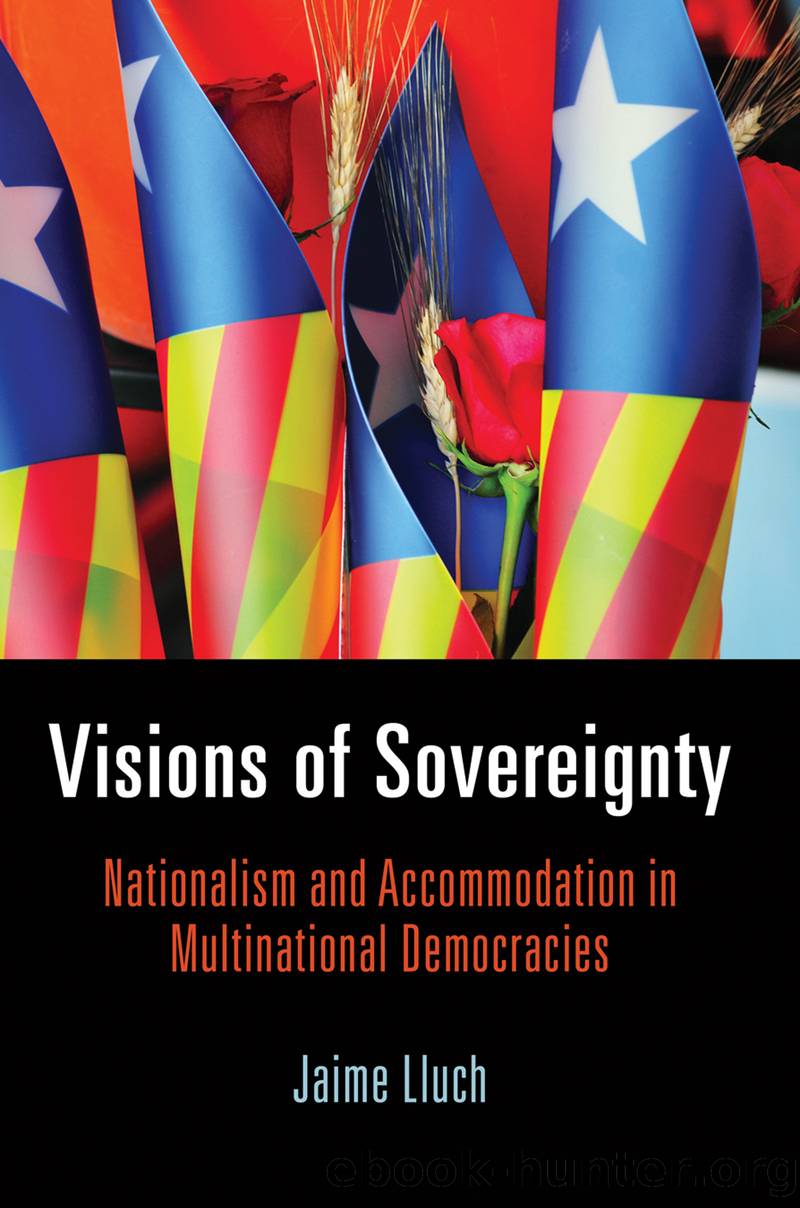Visions of Sovereignty by Lluch Jaime;

Author:Lluch, Jaime;
Language: eng
Format: epub
Publisher: University of Pennsylvania Press
Published: 2019-08-15T00:00:00+00:00
Devolutionary Autonomies
Autonomies that are created in âunion-statesâ or unitary states, undergoing a process of asymmetric decentralization or âdevolution,â have some federal features. Those that have been created in the United Kingdom since 1998 are the most illuminating contemporary exemplars of the cases covered by my scope conditions. I will here focus on Scotland, although some of the generalizations will also be applicable to Wales, and, less so, to Northern Ireland (Loughlin 2001; Keating, Salmon, and Queenâs University 2001).
âDevolutionâ is a distinctly British term coined in the nineteenth century. It has some similarities to federal political systems but with a number of distinct features. Powers and governmental authority have been transferred to the territories and nations, but the ultimate sovereignty of the Westminster Parliament remains unaltered. âWestminster retains the constituent power and could even suspend or abolish the devolved institutions (as happened in Northern Ireland in 1972, 2000, and 2002)â (Keating 2005). The devolved institutions of the UK are not currently constitutionally entrenched, and Westminster could, theoretically, change them unilaterally and by ordinary law. The custom at present is that âLondon will ânormallyâ not overrule the Scottish Parliament on devolved matters, but it insists on a residual claim to do soâ (Keating 2009). These are nonfederalist elements that devolutionary autonomies in the UK share with nonfederalist autonomies such as Puerto Rico because their autonomic (or devolutionary) institutions are constitutionally subordinate to the center. It also violates the general federalist principle that âfederalism involves a polycentric noncentralized arrangement in which neither the constituent governments nor the general government can unilaterally alter the constitutional distribution of powerâ (Griffiths, Nerenberg, and Forum of Federations 2005). The devolved institutions in the UK have a constitutionally subordinate status rather than coordinate status. For many years a unitary state, the United Kingdom has engaged in a process of devolutionary decentralization recently (McGarry 2002). Most scholars would agree with Ronald Watts, who has questioned whether the UK is a âquasi-federationâ and has argued that it is closer to the model of a decentralized union with some federal features (Watts 2008: 16; Trench 2007; Keating 2009). In other words, as a âdecentralized union with some federal features,â the UK (like Italy) would be a type of âfederal political systemâ only if the latter is defined very broadly (Watts 2008: 8). Moreover, the language of classic federalism may not be sufficient to understand devolutionary autonomies (Suksi 2010).
In Scotland, as in federal political systems, some competences have been devolved to Scotland, some have been reserved to the center, and others are shared between the two. Yet, unlike a genuine federation, âthe constitutional limits apply only to Scotland and not to Westminster, which retains the right to legislate even within devolved spheres, although under the Sewell conventions ⦠this should happen only with the consent of the Scottish Parliamentâ (Keating 2005). In addition, the UK institutional arrangement is highly asymmetrical, given that âWestminster continues to rule directly in England and proposals for regional government there fall far short of creating units comparable with Scotland.
Download
This site does not store any files on its server. We only index and link to content provided by other sites. Please contact the content providers to delete copyright contents if any and email us, we'll remove relevant links or contents immediately.
The Secret History by Donna Tartt(19092)
The Social Justice Warrior Handbook by Lisa De Pasquale(12190)
Thirteen Reasons Why by Jay Asher(8912)
This Is How You Lose Her by Junot Diaz(6889)
Weapons of Math Destruction by Cathy O'Neil(6281)
Zero to One by Peter Thiel(5802)
Beartown by Fredrik Backman(5756)
The Myth of the Strong Leader by Archie Brown(5509)
The Fire Next Time by James Baldwin(5447)
How Democracies Die by Steven Levitsky & Daniel Ziblatt(5219)
Promise Me, Dad by Joe Biden(5154)
Stone's Rules by Roger Stone(5088)
A Higher Loyalty: Truth, Lies, and Leadership by James Comey(4964)
100 Deadly Skills by Clint Emerson(4926)
Rise and Kill First by Ronen Bergman(4790)
Secrecy World by Jake Bernstein(4753)
The David Icke Guide to the Global Conspiracy (and how to end it) by David Icke(4720)
The Farm by Tom Rob Smith(4514)
The Doomsday Machine by Daniel Ellsberg(4490)
